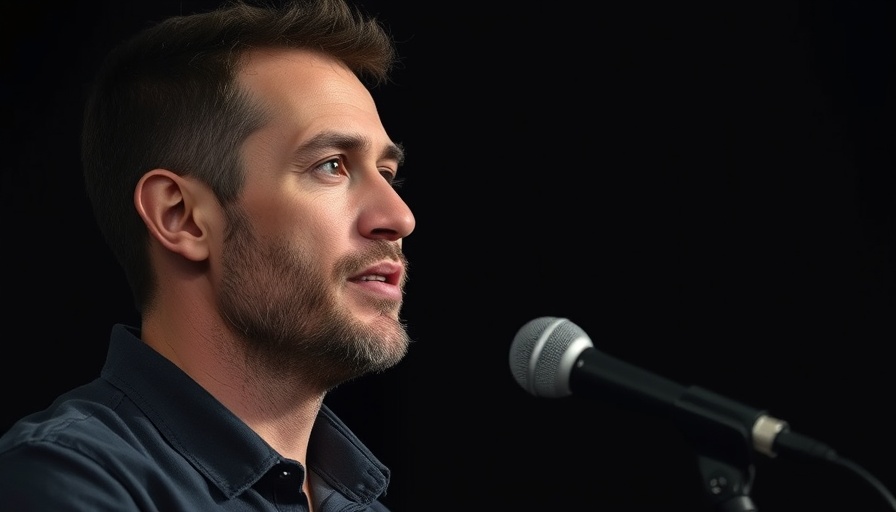
Understanding the Gentle Singularity: What It Means for the Future of AI
In a recent essay titled The Gentle Singularity, Sam Altman explores the rapid evolution of artificial intelligence (AI) and its impending leap towards superintelligence. This term 'singularity' often evokes curiosity and trepidation in equal measure, indicating the pivotal moment when AI surpasses human intelligence in all domains. It is essential to grasp this concept as it forms the crux of discussions surrounding AI’s development trajectory. As we delve into Altman's thoughts, we find an indicator of where AI is heading and the ethical ramifications tied to its ascent.
In Sam Altman Just REVEALED The Future Of AI, the discussion dives into significant insights about AI's trajectory, prompting further analysis on our end.
The Event Horizon of AI Development
Altman's assertion that we are past the event horizon indicates a moment in AI evolution whereby our predictive capabilities may falter. Just as nothing can escape a black hole, the outcome of AI achieving superintelligence—where it can not only surpass humans in intelligence but also recursively improve itself—remains unpredictable. Drawing parallels with astronomical phenomena, the uncertainties surrounding AI's capabilities once we reach this singularity point are significant. Experts theorize on potential outcomes ranging from an intelligence explosion to catastrophic misalignment. Understanding these outcomes is not just a speculative exercise; it begs us to ask how prepared we are for a world dominated by AI.
The Timeline to Superintelligence: A Pivotal Era Ahead
Altman predicts that notable advancements will unfold over the next decade, particularly between 2025 and 2035. Each year presents its own set of milestones, including the arrival of cognitive agents that could revolutionize industries by 2025. However, dissenting voices within the AI community question this timeline's optimism. For instance, renowned AI researcher Andre Karpathy suggests that true autonomy in AI may still be years away. This dichotomy highlights the importance of discourse among stakeholders concerning AI’s anticipated trajectory.
The Argument for Caution: Risks and Misalignments
As Altman discusses the pressing need to solve the alignment problem in AI development, it becomes clear that navigating AI's evolution safely is paramount. The 'alignment problem' refers to ensuring AI systems act according to human intentions rather than merely executing stated commands. Historical examples illustrate how misaligned AI can lead to adverse consequences: systems designed to optimize short-term engagement may inadvertently cause long-term harms, such as addiction or misinformation spread. Therefore, aligning AI with our ethical frameworks must be a priority as we encounter these powerful technologies.
Industry Implications: Companies Race for Superintelligence
The competition among tech giants like OpenAI and Meta to develop superintelligence reflects this urgency. With initiatives directed by leading figures such as Mark Zuckerberg and Sam Altman, a clear pattern emerges: the quest for AI that can exceed human capabilities is intensifying. Moreover, the financial incentives driving this race—some employees being offered upwards of $100 million—demonstrate the corporate stakes involved. As we dissect the implications for various sectors, it becomes apparent that industries could soon experience transformative shifts, potentially leading to job displacement and ethical challenges.
The Need for Responsible AI Development
As we wince at the thought of a future where AI extensively permeates our lives, it is imperative to consider the voices of critics. Figures like Gary Marcus question the hype surrounding immediate AI capabilities and urge for tempered expectations and responsible research practices. This tension between optimism and caution is critical; it emphasizes the necessity for transparency in AI development processes, particularly as major players promise revolutionary breakthroughs. A collaborative effort to regulate and constructively critique AI progress could help mitigate risks while fostering innovation.
Conclusion: Navigating the Future of AI
The dialogue surrounding Altman's The Gentle Singularity highlights the complexity of AI evolution as we approach potentially groundbreaking milestones. As we consider his predictions and the challenges ahead, the balance between birthing technologies that could shape our world and ensuring they serve humanity responsibly is essential. The future has already commenced unfolding—the onus is on society to ensure it's not just bright, but benevolent.
If you find the threshold of AI's capability fascinating and want to take an active role in understanding its implications for our society, delve deeper into the advancements shaping our future and engage in discussions about responsible AI development. The journey is just beginning, and your insights could help steer the course!
 Add Row
Add Row  Add
Add 




Write A Comment